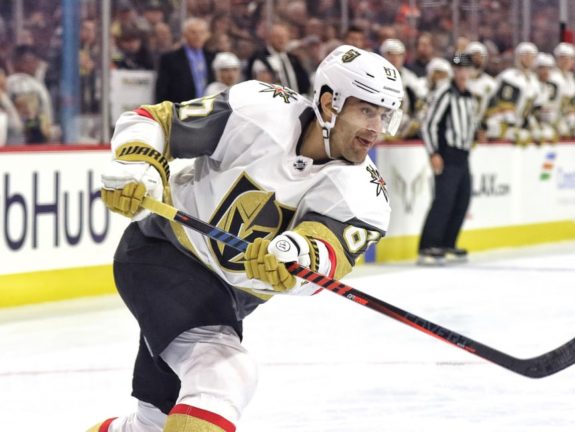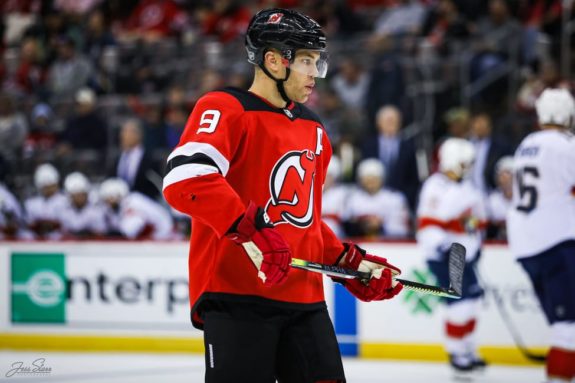Taylor Hall’s future with the New Jersey Devils is of much speculation these days. He’ll be an unrestricted free agent (UFA) in July, and with the Devils’ awful start to the season, it’s looking less likely he’ll sign before the Feb. 24 Trade Deadline. That means general manager Ray Shero will have a decision to make, and it appears he’s begun listening to teams about potential trade offers.
There’s still plenty of time until Feb. 24 rolls around. But the closer that date approaches without Hall signed will only make Shero’s decision easier. And with the Devils having a massive hill to climb to get into playoff contention, he may have no choice but to trade Hall. Here are two recent comparables that could give us a baseline if the Devils happen to trade Hall away.
The Max Pacioretty Trade
When the Montreal Canadiens traded Pacioretty in Sept. 2018, his situation wasn’t too different from Hall’s. He was 29 years old at the time, while Hall just turned 28 a few weeks ago. Pacioretty was in the final year of his contract and would’ve become a UFA in July 2019, while Hall is in the final year of his contract.
In terms of on-ice production, Hall has the advantage. He finished with 93 points and the Hart Trophy as the league’s MVP in 2017-18. He was also on pace for 92 points last season before an injury cut his season short. At the time of his trade, Pacioretty was coming off his worst season in quite some time, with 37 points in 64 games. But he finished with 60-plus points in the previous four seasons, so he was a good candidate to rebound.

So what did the Canadiens get in return for Pacioretty? They acquired a top-six forward in Tomas Tatar, Nick Suzuki — one of the Golden Knights’ top prospects — and a second-round pick. As part of the deal, Pacioretty signed a four-year, $28 million extension with the Golden Knights.
Since the trade, Tatar has 82 points in 107 games with the Canadiens and is on pace to finish with 73 points in 82 games this season. Suzuki has played in all 27 NHL games this season and has 13 points — a 39-point pace over 82 games. At only 21 years old, his upside is sky high, and he could be a potential impact player for the Canadiens in the not too distant future.
The Mark Stone Trade
The Golden Knights seem to have a knack for making blockbuster trades in their short time as an NHL franchise. They acquired Stone from the Ottawa Senators at last season’s trade deadline and signed him to a whopping eight-year extension, with an average annual value of $9.5 million.
Stone, who was 26 years old at the time of the trade, was in a pretty similar situation to Hall. He was on an expiring contract, and it wasn’t looking like he’d re-sign with the Senators, at least before the trade deadline. That meant the Senators had to get something in return, and while it wasn’t quite what the Canadiens got for Pacioretty, they still managed to get something valuable.
Related: Devils’ Downward Spiral Deepens
Erik Brannstrom, one of the best prospects in the NHL, was the centerpiece for the Stone trade. He could be an elite, puck-moving defenseman in his prime if he reaches his potential, which the Senators could use after they traded Erik Karlsson to the San Jose Sharks. However, the Senators didn’t get much of anything else in the rest of the trade. They did get a second-round pick, but the other player involved, Oscar Lindberg, is now playing in the NLA (Switzerland).

The Senators probably don’t get a prospect like Brannstrom if Stone doesn’t sign an extension. And the same is true of the Canadiens and Suzuki if Pacioretty doesn’t sign an extension. If Shero finds a suitor who can pull off a sign-and-trade, it’s plausible to get a top prospect, a draft pick, and an NHL-caliber player, especially since Hall is one of the best wingers in the league. But if he wants to control the process if he where he signs long-term, agreeing to an immediate extension with any team that acquires him may not be likely.
Trading Hall Might Be the Only Option
The reality is it’s not looking great for Hall signing an extension with the Devils. Maybe things would be different if they were in the thick of the playoff race, but even then, it’s not a given. He could sign with the team at the 11th hour as Steven Stamkos did in 2016, but that’s a risk the Devils can’t afford to take. And that means Shero won’t have much choice other than trading him, even if it’s as a rental.
That may not be the ideal scenario, as it would likely lower Hall’s trade value a bit. But it may be the most probable, and the Devils should still get a good return. At a minimum, Shero should receive something similar to what the Senators acquired for Stone — a top prospect and first-round pick should be the floor. Say a team like the Colorado Avalanche gets involved, a first-round pick and prospect Bowen Byram aren’t out of the question.

The bottom line is the Devils can’t let Hall walk as a free agent because that’s an absolute worst-case scenario. If they were Stanley Cup contenders, they could let it play out that way, but that’s far from the case. Instead, they need a return that can help them reset quickly.
Related: Devils at the Quarter Mark: Little Margin for Error
They have a solid core of young players in Jack Hughes, Nico Hischier, Jesper Bratt, and a few other prospects. If trading Hall gives them some additional young pieces to build around Hughes and Hischier, they can turn this around in short order. Because when this time next year approaches, there won’t be any excuses for the Devils to be in the running for the first overall pick in the 2021 Entry Draft.